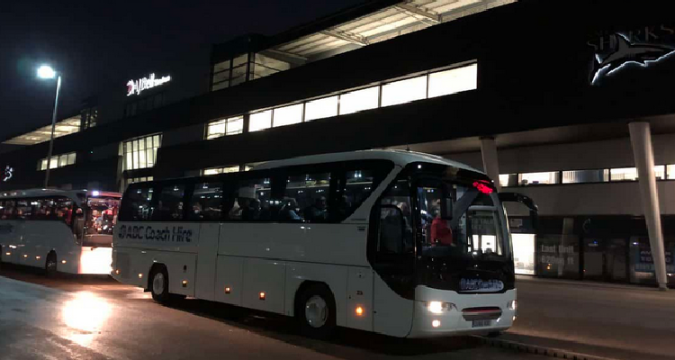
For football teams, efficient travel logistics are essential to ensure players arrive at away matches in optimal condition. Managing transportation for away games involves balancing convenience, cost-effectiveness, and comfort, making it necessary to have a well-planned strategy. From selecting the right transportation mode to creating contingency plans, this guide offers essential tips to help football teams optimize their transportation logistics and maintain focus, even on the road.
1. Begin with Comprehensive Planning
Effective transportation management starts with comprehensive planning. Once an away game is confirmed, team managers should gather information on the destination, including travel distance, estimated travel time, and local traffic conditions. Early planning ensures teams have ample time to arrange transportation that aligns with the schedule and specific needs of the players.
For nearby matches, buses are typically the preferred option, allowing the team to travel together and stay on a flexible schedule. For longer journeys requiring flights or trains, planning in advance is essential to secure seats for the whole team and explore direct options that minimize travel time and fatigue. Early booking can also reduce costs, provide access to premium services, and enable teams to plan around potential busy travel days or peak times.
2. Choosing the Right Mode of Transport
The choice of transportation mode significantly impacts the team’s travel experience. For matches within a few hours’ drive, a team bus is often ideal. Buses provide privacy, allow for team bonding, and can be scheduled flexibly to meet the team’s needs. When selecting a bus provider, look for features like comfortable seating, air conditioning, Wi-Fi, and onboard facilities such as restrooms, especially for longer trips.
For matches that require extensive travel, flights or trains may be the most efficient options. Direct flights are preferred as they reduce overall travel time and eliminate the stress of layovers or transfers. For mid-range travel distances, trains can be an excellent option, offering space, stability, and an environment conducive to relaxation. Ultimately, the mode of transport should prioritize player comfort, minimize fatigue, and provide an efficient route to the destination.
3. Coordinating with the Destination Venue
Effective transportation logistics also involve close coordination with the match venue and, if necessary, local transportation providers. Communicating with the destination venue about the team’s arrival time, vehicle type, and any specific requirements can streamline arrival procedures and prevent delays. By ensuring that parking arrangements and access points are organized in advance, teams can quickly settle in and begin pre-game routines.
For flights or train arrivals, pre-arranging transfers from airports or stations to the venue or team hotel is also crucial. This coordination eliminates potential wait times, allowing the team to move efficiently from one location to the next. Designating a logistics coordinator to manage communications with the venue and local transport providers can further smooth the process and ensure the team’s needs are met.
4. Building Flexibility into the Schedule
Flexibility in the travel schedule is essential to accommodate any unforeseen delays, such as traffic congestion, flight delays, or weather disruptions. Including buffer time in the schedule helps ensure the team arrives on time without unnecessary stress. A detailed itinerary should account for extra time at key points, such as before departure and upon arrival, allowing the team to adjust for last-minute changes.
Having a flexible schedule also means preparing backup options for alternative travel routes or accommodations if needed. For example, if the team is traveling by bus and encounters a road closure, an alternate route should be mapped out in advance. Similarly, having standby flight options can be helpful if delays occur, and notifying the destination venue of any changes in arrival time ensures they are prepared to accommodate any adjustments. Flexibility in travel plans allows teams to adapt to unexpected events, so they remain focused on game-day performance.
5. Ensuring Player Comfort and Well-being
Ensuring player comfort is a key consideration when optimizing travel logistics for away matches. Long hours of travel can lead to fatigue, impacting performance on the field. Prioritizing transport options that offer comfortable seating, climate control, and adequate legroom can significantly enhance the travel experience for players.
For bus journeys, scheduling short breaks to stretch and refresh can prevent stiffness. When flying or taking the train, reserving business-class or extra-legroom seats can provide the space players need to relax and recover. Additionally, providing meals, snacks, and hydration options keeps players energized and focused during transit. Comfort-focused travel ensures players arrive feeling rested and ready to compete, enhancing their ability to perform on the field.
6. Planning Efficient Post-Game Transportation
Post-game travel logistics are just as important as the pre-game journey. After a physically demanding match, players need efficient transport arrangements to begin their recovery without unnecessary delays. Pre-arranged return transportation, whether a bus or shuttle, should be readily available to prevent extended waiting times. If the return journey is lengthy, teams may consider scheduling rest stops or arranging overnight accommodations to ensure players are well-rested.
Teams traveling overnight by bus may opt for providers offering reclining seats or sleeping facilities, which can aid player recovery. Efficient post-game transportation also means minimizing disruptions and helping players begin rest and recovery sooner. By prioritizing return logistics, teams can support player wellbeing and help them prepare for the next game or training session.
Conclusion
Optimizing transportation for away matches involves meticulous planning, flexibility, and a focus on player comfort. From selecting the right travel mode to coordinating with local venues and building contingencies, each element plays a crucial role in ensuring that the team arrives at their destination focused, rested, and ready to compete. Effective travel management helps players stay sharp and prepared, allowing teams to perform at their best on away fields. By following these strategies, football teams can turn away game travel into a streamlined, positive experience that supports their overall success on the field.